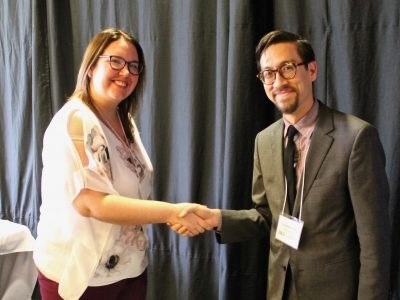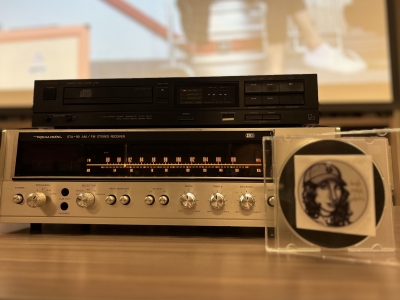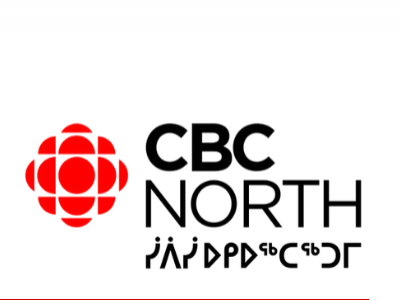Carleton PhD student Sarah MacLean was awarded this year’s Canadian Journal of Communication (CJC) Paper Award during the 14th Annual Communication Graduate Caucus (CGC) Conference. She was selected as the winner through a process of double blind per review. According to Professor Benjamin Woo, who administered the competition: “The CJC Prize recognizes some of the excellent and ground-breaking work being done by graduate students in the fields of Communication and Media Studies. Sarah’s paper on personal digital health technologies is no exception. It represents the kind of timely, critical, and publicly engaged scholarship that our program and the CGC Conference is known for.”
Professor Chris Russill, editor of the Canadian Journal of Communication, added: “It is uncommon to see critical intelligence blended with such a humble and generous approach and we were very pleased to hear the review committee recognized and rewarded Sarah’s work.”
Congratulations! Can you share with us the details of what your paper is about?
The work that I submitted for the conference is actually somewhat separate from my area of study (which focuses on violence against women and girls). It was borne out of my work outside of Carleton, as a Clinical Research Associate for the Ottawa Hospital Research Institute (OHRI). In this role, working with Dr. Simon Hatcher and colleagues at the Hatching Ideas Lab, I assisted with the development, testing, and implementation of The BEACON Platform, a digital solution designed to extend the reach of face-to-face psychotherapy among men who present to the Emergency Department for an episode of self-harm.
Within the fields of medicine, public health and epidemiology, research on digital health technologies tend to focus on the ways in which these technologies improve patient outcomes, increase access to health care and reduce the economic burden on the system (which they absolutely do). However, there is a need to approach these technologies critically, which is where my paper comes in.
Using the BEACON Platform as a case study, I argue that mental health apps, which purportedly serve to democratize healthcare by placing patients in charge of their own care, actual serves to create good neoliberal citizens by their very design. Using Science and Technology Studies (STS) approaches, specifically domestication theory, I explore how this “neoliberal training” occurs at every phase of the design and adoption process: from the design of the technological artifact, to the construction of the imagined user(s) to how it is then marketed to users to increase adoption.
What was your reaction when you found out you won the award?
Each student who presented at the conference was also invited to submit their full paper for consideration for the Canadian Journal of Communication Student Paper Prize. While I am of course honoured to have been chosen for this award, it was very unexpected. As Dr. Woo was describing the paper, as soon as I heard the words “digital health technologies”, I could feel myself redden. There is surely and awkward photo of the two of us out there somewhere.
More surprising still has been the amount of attention I have received regarding this award. The Communication and Media Studies program has been so congratulatory, and it has been very overwhelming. Although, this sense of collegiality is the reason that I chose to complete my doctoral work here so I am happy to see that I was right about that.

Sarah MacLean poses for a picture with Professor Benjamin Woo after receiving her award.
What are you working on next?
I am working right now to publish two manuscripts based on this presentation – one that focuses on the methodology of “doing” critical digital health technology studies and one that is a case study of the BEACON Platform. Other than this, I am taking the summer to recharge after a grueling first year in the doctoral program in what I am dubbing the “2019 Conference Tour”. I will be heading to the Canadian Communication Association’s Annual Conference in June in Vancouver, BC and am still waiting to hear on a couple more conferences that are happening this summer. Then, I will be back at it in September!
What area do you aspire to work in after you’re completed your studies at Carleton University?
This is a loaded question – haha! While I would love to move on to an academic position, I have come into this degree with my eyes open and am aware of how challenging that might be. I am trying to keep an open mind and say yes to opportunities as they arise. We will have to wait and see where that takes me.
Congratulations, Sarah!
Sunday, March 31, 2019 in Communication News, News
Share: Twitter, Facebook



